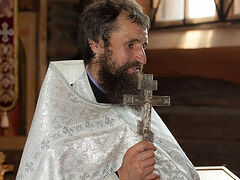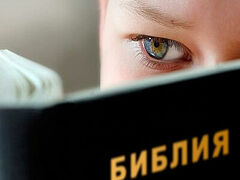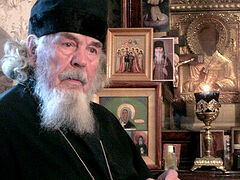There are people whom the Lord sends into our lives for a very short time, but their memory remains in our hearts for the rest of our lives. I met Fr. Vyacheslav Velichko at the very beginning of my life in the Church. I saw him only a few times, but now, after so many years, I haven’t forgotten those meetings.
I was seriously ill. At that time the Lord sent me a friend of my classmate, with whom I had been previously acquainted, but I didn’t know that he believed in God and was a very compassionate person. He gave me the first Gospel of my life, along with icons of the Mother of God and Great-Martyr Panteleimon. Together with a hieromonk and a parishioner of our St. Alexander Nevsky Church (in Tbilisi), they began to help me prepare for my first Communion. In the church the hieromonk took me to a priest. It was Fr. Vyacheslav.
I saw an elderly man with kind, tired eyes but a piercing gaze. After listening attentively to my story about how long I had been sick, he told me to read prayers, make the sign of the cross over my whole body, and be sure to prepare for Communion. Upon learning that I couldn’t eat, the priest said, “Eat pollen.” I was surprised that Fr. Vyacheslav was aware of such things. I couldn’t have imagined that the priest himself was seriously ill and because of pains in his stomach he couldn’t eat practically anything, except bee pollen diluted with water.
Fr. Vyacheslav heard my confession, naming all my sins, while I just nodded or shook my head, meaning yes or no. It was explained to me what prayers I should read before the sacrament, and one day I got ready and came to church. In our church there is a left side-chapel in honor of St. Nicholas the Wonderworker, and I stood there, far from the main altar. Suddenly I saw Fr. Vyacheslav come out of the altar and peer at me intently. Then he called the hieromonk over and said something to him. The hieromonk walked through the entire church, came up to me and said, “Father Vyacheslav is asking: “Why has she come to Communion without her cross on?”
And I remembered that I had left my cross at home. In the morning, while I was washing my face, I had taken it off, put it on the shelf in the bathroom, forgot about it and left it there. Then suddenly I was struck with amazement: how could the priest know this?! I was dressed in a blouse buttoned up to the neck and with a large headscarf on top. Under these clothes, he simply couldn’t have seen whether there was a cross on me or not! I raised my eyes and opened them wide in surprise at the hieromonk. But he, not at all surprised, said, “You must never take off the cross! The cross is our protection, our weapon. It should always be with you, do you understand?”
Then I saw Fr. Vyacheslav once more while he was still alive. He had cancer, but very few knew about it. He never told anyone, never complained, and never showed how bad he felt.
There were many people at the funeral service for Fr. Vyacheslav. It was said that he endured terrible pains and didn’t want to take any drugs to relieve them. When Catholicos-Patriarch Ilia II wondered why Fr. Vyacheslav didn’t resort to painkillers, he replied, “All my life I called on my spiritual children to endure all the sorrows that the Lord sends us. Therefore, I must myself endure what has been sent to me.” And he endured, calling for help from the Most Holy Theotokos to Whom all his life he had taught his spiritual children to pray.
***
Fr. Vyacheslav’s path wasn’t easy. He was born on March 8, 1929. As a little boy he suffered many hardships. His father was arrested as a believer under the infamous Article 58 of the USSR Penal Code1 and sent to labor camps. His mother was left with three small children in her arms. They were thrown out of their house, and there was nowhere to live. They had to move to a drafty, dilapidated shack. The hunger was terrible. Their mother would cut up a frozen potato into three for her children to somehow last out, leaving nothing for herself. Fr. Vyacheslav recalled how he couldn’t walk from hunger, and lay on the ground waiting for death. But the Lord kept His chosen one. One night little Fr. Vyacheslav felt as if someone had pushed him. He woke up and saw that the stove in the shack was smoking. That night they everybody could have died in a fire.
Upon his release, Fr. Vyacheslav’s father was prohibited from living in Russia. He was ordered to move to the Azerbaijani city of Belakan, close to the town of Lagodekhi across the Georgian border. Having learned about that, his mother took her children, a bundle with simple belongings and went to her husband. They soon moved to Georgia.
Fr. Vyacheslav was persecuted for his faith both at school and in the army. But the Lord helped there too, sending him religious people. One day his army boss summoned him and asked which faith he belonged to. Fr. Vyacheslav replied that he was Orthodox. From that day on the boss treated him kindly to protect him from attacks.
 Subsequently, the future priest worked in Tbilisi as a radio assembler at factory No. 31. Simultaneously, he served as a reader in church. When the time came to choose between secular service and church service, Fr. Vyacheslav chose in favor of the Church and was ordained priest.
Subsequently, the future priest worked in Tbilisi as a radio assembler at factory No. 31. Simultaneously, he served as a reader in church. When the time came to choose between secular service and church service, Fr. Vyacheslav chose in favor of the Church and was ordained priest.
At first he served in the Church of Great-Martyr Barbara, and then in our Church of St. Alexander Nevsky (both in Tbilisi). He was a spiritual son of the Glinsk Elder Schema-Archimandrite Andronik (Lukash; 1889–1974, feast: September 9/22). He was a great man of prayer and never parted with the Psalter, on the margins of which he wrote explanations with his own hand. He read the Psalter between services. He was always ready to help others and had a warm, loving and tender heart. He had the gift of special prayer for those in need.
Once Fr. Vyacheslav was invited to give Communion to a dying woman. While the priest was reading the necessary prayers, it turned out that the woman had already died. He began to pray fervently, and through his prayers the sick woman came back to life, opened her eyes, took Communion, and after that departed to the Lord.
Fr. Vyacheslav loved the Church and the service selflessly. When public transport didn’t work in Tbilisi in the 1990s, he walked for several hours to the church and back. Fr. Vyacheslav was a father figure to the choir singers and helped them a lot. Knowing from childhood what need is, he gave them large packages of food, which were brought to him by grateful parishioners.
One of Fr. Vyacheslav’s relatives had a low opinion of the priesthood. Soon after his death he appeared to Fr. Vyacheslav in a dream, chained by terrible chains, imploring him, “Help me! I know you can!” The priest began to pray for his relative, and on the fortieth day he saw him in a dream again in a white robe—Fr. Vyacheslav’s prayers saved him.
Many people received help during their lifetime through the prayers of Fr. Vyacheslav. Once he was invited to give Communion to a gravely ill person. He was in such emaciated condition that the priest didn’t immediately see him under the blankets. There was a coffin on the balcony. Fr. Vyacheslav gave Communion and Unction to the sick man. After a while, a man in excellent health came to his church. It was difficult to recognize in him the dying man to whom Fr. Vyacheslav had earlier given Communion and for whom, no doubt, he had offered up prayers to the Lord. A woman who had suffered from infertility for many years through his prayers conceived, carried and gave birth to a baby girl.
Not only the Orthodox knew about Fr. Vyacheslav’s God-given gift of healing. Once a Muslim came to his church. He was with difficulty leading his wife, who had lost her mind. The Muslim said that his mullah had advised him to go to St. Barbara’s Church and find Fr. Vyacheslav, who would heal his wife. Fr. Vyacheslav covered the woman with his epitrachelion, read the troparion to St. Barbara, and then continued to pray for the unfortunate one at home. After a while, the couple came to church again—this time to thank Fr. Vyacheslav. It was difficult to recognize in this woman with a healthy, reasonable look the one whom her husband had barely brought there some time before. And there were many such cases of healing through Fr. Vyacheslav’s prayers.
Once Fr. Vyacheslav was invited to a hospital to bless one of the wards. After the death of a patient, a foul-mouthed person who was in agony and he couldn’t die for a long time, there was a terrible smell there that didn’t go away, though the room was ventilated many times. The priest prayed, sprinkled the ward with holy water, and the bad smell passed.
Fr. Vyacheslav was very humble. He valued obedience very highly. At one time his kidneys hurt badly. It was Pascha. The Catholicos-Patriarch asked him to go to Yerevan to serve in an Orthodox church that was there at the time. For the sake of obedience, Fr. Vyacheslav went and served there. And when he came back, he found that he was healed.
Batiushka prayed a lot for others and took many other people’s infirmities on himself. Once at night during prayer a demon appeared to him, shook his finger at the priest, and disappeared.
Fr. Vyacheslav didn’t think about himself, even when he fell seriously ill. On his sore, swollen legs with non-healing trophic ulcers, he could walk for hours in the pouring rain to those who needed help, and at night pray for the suffering, asking the Lord to have mercy on them. One day, while walking to the church, he fainted from severe pain. But as soon as he regained his senses, he hurried to church, and no one knew what this had cost him. Endurance, courage and patience were the distinguishing qualities of this priest. And also Christ-like love for God and people.
Fr. Vyacheslav greatly venerated St. John the Baptist. While celebrating a prayer service, at the end he would always add the troparion to this holy prophet. And he fell asleep in the Lord on the feast of the Nativity of St. John the Baptist—July 7, 1998.
Shortly before his death, Fr. Vyacheslav took monastic vows with the name Barsanuphius. In a photo of the funeral service, a white pillar of light rises from the coffin in the church straight to heaven. On the fortieth day after his repose, Fr. Barsanuphius appeared to a female chorister who had grieved very much after his death. He was in such radiance, surrounded by a multitude of people, that it was virtually impossible to look at him. He walked up and laid his hands on her head. She woke up with a feeling of unspeakable joy in her heart.





